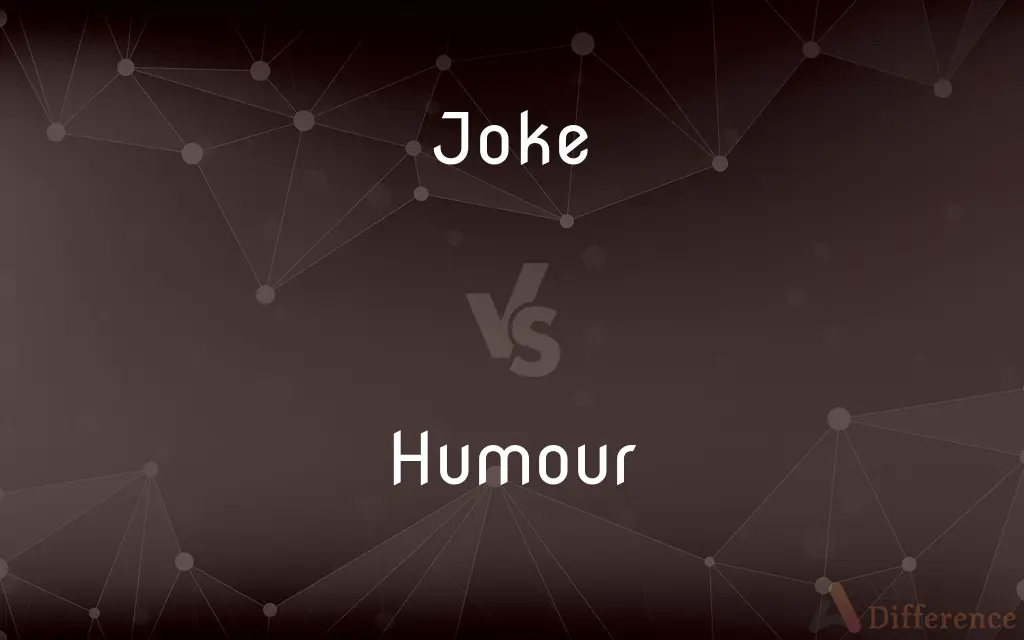Joke vs. Humour — What's the Difference?
By Tayyaba Rehman — Updated on October 19, 2023
A joke is a specific remark or story intended to evoke laughter, while humour is the general quality or ability to perceive or express what's funny.

Difference Between Joke and Humour
Table of Contents
ADVERTISEMENT
Key Differences
Jokes are constructed narratives or statements made with the intent to amuse its audience. They often have a setup and a punchline, creating a surprising or clever twist. Humour, on the other hand, is a broader concept that encompasses the ability to recognize, enjoy, or express what is comical or amusing. It's the overarching trait or quality that allows individuals to understand and appreciate jokes.
While jokes are tangible manifestations of humour, being structured and defined, humour is an abstract quality. One might share a joke to make someone laugh, but that person's appreciation for the joke comes from their sense of humour. Similarly, not all humour has to be conveyed through jokes. It can manifest in various forms, from situational comedy to witty remarks.
Jokes, being specific entities, can be translated, shared, or modified, but their effectiveness often relies on cultural, linguistic, or contextual cues. Humour, meanwhile, is a universal human experience but varies widely from person to person and culture to culture. What one individual finds humorous, another might not, based on personal preferences, experiences, or cultural backgrounds.
In communication, jokes are tools wielded to produce a laugh or lighten a mood. They're often used in speeches, writings, or casual conversations. Humour, being an intrinsic quality, influences how one perceives the world, interacts with others, and copes with challenges. It's not just about laughing but understanding and appreciating the lighter or ironic side of situations.
Comparison Chart
Nature
Specific and structured
Abstract and overarching
ADVERTISEMENT
Function
Intended to provoke laughter
Ability to perceive or express the funny side
Dependency
Relies on cultural or contextual cues
Universal but varies among individuals and cultures
Usage in Communication
Used as tools in conversation
Influences perception and interaction
Form
Typically has a setup and punchline
Can manifest in various forms, not just jokes
Compare with Definitions
Joke
A short narrative or assertion that ends in a punchline.
She told a joke that had everyone laughing.
Humour
The quality of being amusing or entertaining.
His humour is what makes him so likable.
Joke
Something said or done to provoke laughter.
His antics at the party were no joke.
Humour
A mood or disposition.
He was in good humour after receiving the good news.
Joke
A joke is a display of humour in which words are used within a specific and well-defined narrative structure to make people laugh and is usually not meant to be taken seriously. It takes the form of a story, usually with dialogue, and ends in a punch line.
Humour
The trait of recognizing or creating amusement in situations.
Using humour, she diffused the tense situation.
Joke
Something said or done to evoke laughter or amusement, especially an amusing story with a punch line.
Humour
The ability to perceive, enjoy, or express what is funny.
Everyone appreciated her sharp sense of humour.
Joke
A mischievous trick; a prank
Played a joke on his roommate.
Humour
Humour (Commonwealth English) or humor (American English) is the tendency of experiences to provoke laughter and provide amusement. The term derives from the humoral medicine of the ancient Greeks, which taught that the balance of fluids in the human body, known as humours (Latin: humor, "body fluid"), controlled human health and emotion.
Joke
Something that is of ludicrously poor quality
Their delivery service is a joke.
Humour
The quality of being amusing or comic, especially as expressed in literature or speech
His tales are full of humour
Joke
Something not to be taken seriously; a triviality
The accident was no joke.
Humour
A mood or state of mind
Her good humour vanished
The clash hadn't improved his humour
Joke
An object of amusement or laughter; a laughingstock
His loud tie was the joke of the office.
Humour
Each of the four chief fluids of the body (blood, phlegm, yellow bile (choler), and black bile (melancholy)) that were thought to determine a person's physical and mental qualities by the relative proportions in which they were present.
Joke
To tell or play jokes; jest.
Humour
Comply with the wishes of (someone) in order to keep them content, however unreasonable such wishes might be
She was always humouring him to prevent trouble
Joke
To speak in fun; be facetious
You have to be joking.
Humour
Variant of humor.
Joke
To say or write as a joke.
Humour
(uncountable) The quality of being amusing, comical, funny.
She has a great sense of humour, and I always laugh a lot whenever we get together.
The sensitive subject was treated with humour, but in such way that no one was offended.
Joke
An amusing story.
Humour
(uncountable) A mood, especially a bad mood; a temporary state of mind or disposition brought upon by an event; an abrupt illogical inclination or whim.
He was in a particularly vile humour that afternoon.
Joke
Something said or done for amusement, not in seriousness.
It was a joke!
Humour
Any of the fluids in an animal body, especially the four "cardinal humours" of blood, yellow bile, black bile and phlegm that were believed to control the health and mood of the human body.
Joke
(figuratively) The root cause or main issue, especially an unexpected one
Humour
(medicine) Either of the two regions of liquid within the eyeball, the aqueous humour and vitreous humour.
Joke
(figuratively) A laughably worthless thing or person; a sham.
Your effort at cleaning your room is a joke.
The president was a joke.
Humour
(obsolete) Moist vapour, moisture.
Joke
(figuratively) Something that is far easier or far less challenging than expected.
The final exam was a joke.
Humour
(transitive) To pacify by indulging.
I know you don't believe my story, but humour me for a minute and imagine it to be true.
Joke
(intransitive) To do or say something for amusement rather than seriously.
I didn’t mean what I said — I was only joking.
Humour
Same as humor.
Joke
(intransitive, followed by with) To dupe in a friendly manner for amusement; to mess with, play with.
Relax, man, I'm just joking with you.
Humour
A characteristic (habitual or relatively temporary) state of feeling;
Whether he praised or cursed me depended on his temper at the time
He was in a bad humor
Joke
To make merry with; to make jokes upon; to rally.
To joke a comrade
Humour
A message whose ingenuity or verbal skill or incongruity has the power to evoke laughter
Joke
Something said for the sake of exciting a laugh; something witty or sportive (commonly indicating more of hilarity or humor than jest); a jest; a witticism; as, to crack good-natured jokes.
And gentle dullness ever loves a joke.
Or witty joke our airy senses movesTo pleasant laughter.
Humour
(Middle Ages) one of the four fluids in the body whose balance was believed to determine your emotional and physical state;
The humors are blood and phlegm and yellow and black bile
Joke
Something not said seriously, or not actually meant; something done in sport.
Inclose whole downs in walls, 't is all a joke.
Humour
The liquid parts of the body
Joke
To make merry with; to make jokes upon; to rally; to banter; as, to joke a comrade.
Humour
The quality of being funny;
I fail to see the humor in it
Joke
To do something for sport, or as a joke; to be merry in words or actions; to jest.
He laughed, shouted, joked, and swore.
Humour
The trait of appreciating (and being able to express) the humorous;
She didn't appreciate my humor
You can't survive in the army without a sense of humor
Joke
A humorous anecdote or remark intended to provoke laughter;
He told a very funny joke
He knows a million gags
Thanks for the laugh
He laughed unpleasantly at hisown jest
Even a schoolboy's jape is supposed to have some ascertainable point
Humour
Put into a good mood
Joke
Activity characterized by good humor
Humour
A type or genre of comedic expression.
Dark humour is not everyone's cup of tea.
Joke
A ludicrous or grotesque act done for fun and amusement
Joke
A triviality not to be taken seriously;
I regarded his campaign for mayor as a joke
Joke
Tell a joke; speak humorously;
He often jokes even when he appears serious
Joke
Act in a funny or teasing way
Joke
A remark or narrative crafted to amuse its listener.
The joke about the chicken crossing the road is timeless.
Joke
A playful or sarcastic comment.
You're a real comedian, she said, but it was clear she meant it as a joke.
Joke
A matter that need not be taken very seriously.
The malfunctioning app became a running joke in the office.
Common Curiosities
Can someone have a sense of humour but not enjoy jokes?
Yes, humour is broad and personal; one might not appreciate certain jokes but still have a sense of humour.
Why might a joke be funny in one culture but not in another?
Jokes often rely on linguistic, cultural, or contextual cues, which vary across cultures.
Are all jokes humorous?
Ideally, yes, but a joke's effectiveness depends on the listener's sense of humour and context.
Can humour be used as a coping mechanism?
Absolutely, many people use humour to deal with challenges or lighten tough situations.
How do jokes play a role in social interactions?
Jokes can break the ice, create bonds, and elevate moods in social settings.
What's the key difference between a joke and humour?
A joke is a specific remark meant to be funny, while humour is the ability to perceive or express funniness.
Are there different types of humour?
Yes, humour varies and can be slapstick, ironic, dark, satirical, and more.
Can a situation be humorous without a structured joke?
Yes, humour can arise from situations, irony, or simple observations without a formal joke.
Are humour and laughter the same?
No, humour is the appreciation of what's funny, while laughter is the physical expression of amusement.
How do comedians use jokes in their routines?
Comedians craft and deliver jokes to entertain and elicit laughter, often weaving them into larger narratives.
Why might a joke be considered "offensive"?
Jokes can touch on sensitive topics, and if not handled well, they can offend certain listeners.
Can humour be a talent?
Yes, some people have a natural ability to perceive or express humour more effectively than others.
Why do some jokes "age" or become less effective over time?
Cultural norms and references change, which can make certain jokes less relatable or effective.
Can a person be taught to have a sense of humour or tell jokes?
While innate to some extent, people can develop and refine their sense of humour and joke-telling skills.
How does humour benefit mental health?
Humour can reduce stress, improve mood, and provide a fresh perspective on challenges.
Share Your Discovery

Previous Comparison
Scampi vs. Shrimp
Next Comparison
Licorice vs. LiquoriceAuthor Spotlight
Written by
Tayyaba RehmanTayyaba Rehman is a distinguished writer, currently serving as a primary contributor to askdifference.com. As a researcher in semantics and etymology, Tayyaba's passion for the complexity of languages and their distinctions has found a perfect home on the platform. Tayyaba delves into the intricacies of language, distinguishing between commonly confused words and phrases, thereby providing clarity for readers worldwide.
















































